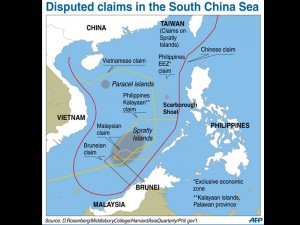China urges Philippines to refrain from stirring public opinion

Map showing the disputed areas in the West Philippine Sea (south China Sea), including the Spratlys Islands and Scarborough Shoal. AFP
MANILA, Philippines—China has urged the Philippines to refrain from making remarks that will influence public opinion about the ongoing dispute over the Scarborough Shoal.
In a statement posted on the Chinese government’s website, Hong Lei, spokesperson for the Ministry of Foreign Affairs, disapproved of President Benigno Aquino’s statements to the press on Wednesday that a military plane would fly over the shoal once the weather cleared and he would order government vessels back there if Chinese ships were still the area.
“China hopes the Philippine side will do more to help the development of bilateral ties and refrain from stirring public opinion, so as to safeguard the recovery of bilateral ties,” the report quoted Hong as saying.
Hong claimed that “the Philippine warships’ harassment of Chinese fishermen in early April single-handedly caused the tension in the area. He added the Philippines’ tough, high-profile stance on the issue continued to heighten tensions after the incident.
But the tensions have eased recently, and the two sides are making efforts to repair bilateral relations, he said.
Sought for comment, Raul Hernandez, Department of Foreign Affairs spokesperson, said:
“We have been trying to de-escalate the tension in the area that’s why we urge our Chinese friends to refrain from making any comment that would tend to re-escalate the tension. Our goal is to deescalate the tension and be able to talk about the issue of Bajo de Masinloc in a diplomatic and peaceful manner.”
Located 220 kilometers west Zambales, Scarborough Shoal is within the Philippines’ exclusive economic zone recognized under the United Nations Convention on the Law of the Sea (Unclos).
But China insists it owns nearly the entire South China Sea, which Manila calls West Philippine Sea, and claims Scarborough Shoal, which it calls Huangyan Island.
The Philippine Navy caught Chinese fishermen poaching sharks and collecting rare clams and corals inside the shoal’s lagoon on April 8. Chinese government vessels came to the poachers’ rescue, blocking Philippine vessels to prevent their arrest.
The Philippine and Chinese vessels faced off with each other at the shoal for more than two months until tensions eased last Friday after diplomats from both countries agreed to pull back.
President Aquino ordered a Philippine Coast Guard patrol vessel and a Bureau of Fisheries and Aquatic Resources survey ship home last Friday night to take shelter from the approaching Typhoon “Butchoy.” China, according to the Department of Foreign Affairs, had committed to remove its vessels, too.
But this week, Philippine officials said half-a-dozen Chinese government vessels and 30 fishing boats remained at the shoal.
Hernandez said the Philippines would continue to pursue its legal track in order to resolve the territorial dispute.
“We believe the legal track is the way forward in this issue as this would enable us to resolve this in a more durable and permanent manner. We are still preparing to pursue this legal track through a dispute settlement mechanism under the United Nations Convention on the Law of the Sea (Unclos),” he told reporters.
Hernandez said they have yet to verify if China had already pulled out its vessels from the lagoon. He said an aircraft has yet to conduct a fly-by in the area to determine if there are still fishing boats inside the lagoon.
“The last count of ships at Bajo de Masinloc was on June 19. There were six government ships outside the lagoon and around 30 fishing vessels inside,” he said.
China, according to the Department of Foreign Affairs, withdrew two government vessels during the weekend.
The Chinese Ministry of Transport announced late last week that more than 20 fishing boats in the shoal’s lagoon were being called home because of bad weather.
Despite statements from China that it had no plans of leaving the shoal, the DFA had insisted that talks were going on for the withdrawal of the Chinese government vessels that were positioned outside the lagoon.
The United States on Thursday called on the Philippines and China to sit down and find a peaceful solution to their territorial dispute in the West Philippine Sea (South China Sea).
US Ambassador Harry Tomas Jr. in a news forum said Washington “has been very clear on our commitment to support a resolution of these claims in a peaceful manner at the negotiating table.”
The DFA said Thomas’ remarks were a reiteration of the US government’s expression of support for the Philippines on the West Philippine Sea issue.
“During the 2+2 meeting in Washington, (US) Secretary (of State Hillary) Clinton expressed deep concern about what was happening in the West Philippine Sea and stated that the US has been plain and consistent in asking China to clarify its motivation and interest in the region,” Hernandez said.
Hernandez added that Clinton also urged all parties to ”subscribe to a rules-based approach in resolving competing claims in maritime areas through peaceful, collaborative, multilateral and diplomatic processes within the framework of international law, including as reflected in Unclos.”
“This is the same position that the Philippines has repeatedly conveyed to China,” Hernandez stressed.














